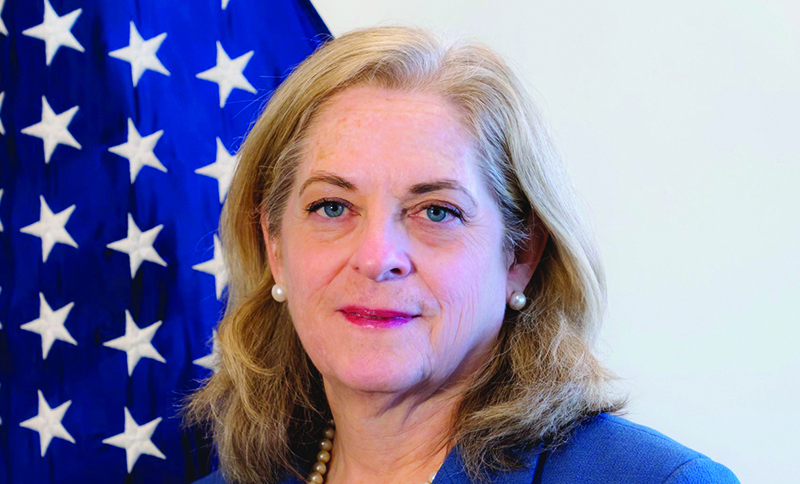

By Jamie Etheridge
KUWAIT: There are around 30,000 American citizens living and working in Kuwait, yet many are unaware of the services their embassy provides. In an interview with US Ambassador to Kuwait Alina L Romanowski, Kuwait Times asks about the services Americans can avail and what they can do for more information in times of crisis.
Kuwait Times: What is the US Embassy’s duty of care toward US citizens in Kuwait?
Ambassador Alina L Romanowski: My first priority is the health and safety of American citizens in Kuwait, which we estimate number over 30,000. During normal times, our consular officers provide a wide range of services for American citizens, which includes passport services, notarials and the issuance of consular reports of birth abroad to name a few.
Though our in-person operations are more limited during COVID-19, our officers are still very busy helping Americans. They are assisting those who need to travel back to the United States, for example. They are fielding questions and working to get important updates out to our American citizens through the Smart Traveler Enrollment Program, or STEP. They are also providing some in-person services such as urgent passport renewals.
Our consular officers are also assisting Americans in emergency situations. For example, if an American citizen is arrested, or if we receive word that an American citizen is in danger, we will work with the Kuwaiti authorities to check on that individual and to make sure they are safe. Consular officers are also keeping in close contact with American prisoners in Kuwait to ensure their welfare is being safeguarded. Our consular officers are extremely dedicated and I could not be more proud of the services they provide.
KT: How does the US Embassy connect with and engage with US citizens in Kuwait?
Ambassador Romanowski: The embassy has traditionally connected with American citizens through our alerts in STEP and through our Citizen Liaison Volunteers. For those American citizens who register in STEP, we send the latest updates on COVID-19, voting and other issues. If you are an American citizen and haven’t already, please enroll in STEP at www.step.state.gov.
We also work with a group of Citizen Liaison Volunteers, who support us in spreading important messages to the American community and who help us understand what issues US citizens face in Kuwait. With more than 30,000 US citizens throughout Kuwait, this is no small effort during COVID-19. The Consular Section has been able to connect with Americans via social media, WhatsApp, Zoom meetings and phone.
We also update our embassy website and social media sites frequently to make sure that US citizens have the latest information. If any US citizen would like to engage with us directly, we are also available via email. Consular officers read and respond to all emails sent to KuwaitACS@state.gov. For emergencies we can be reached by phone at +965 2259-1001.
Services during emergency
KT: What are the kinds of services offered for American citizens during COVID-19 and in emergency cases?
Ambassador Romanowski: During COVID-19, the way we do work has changed, but our top priority - the welfare of American citizens - has not. For emergency situations, our officers are on call at all hours and ready to assist.
Just to illustrate a few examples, consular officers are keeping in close contact with American prisoners to ensure their welfare is being safeguarded. Consular officers have used all forms of communication to make sure a missing American is safe, or to relay messages from hospitalized Americans or notify their family members in tragic situations. Consular officers have helped Americans travel back home urgently to be with their loved ones. These are just a few of the emergencies with which our consular officers can help. I am proud of what our consular officers have done on behalf of their fellow Americans.
KT: Why doesn’t the US Embassy do more in terms of helping American citizens who have legal problems?
Ambassador Romanowski: The US Embassy in Kuwait as well as all US embassies and consulates overseas are prohibited by regulation from acting as agents or attorneys on behalf of US citizens involved in legal disputes. Embassy personnel, including consular officers, do not provide legal advice to the public.
While the embassy may not recommend a specific foreign attorney, we can provide the names of several attorneys who have identified themselves as willing to assist US citizen clients.
Disputes with sponsors
KT: What can the embassy do to help American citizens who have disputes with their sponsors in Kuwait?
Ambassador Romanowski: While I am sympathetic to the difficulties faced by Americans navigating the legal system of a foreign country, we are prohibited by US law from acting as agents or attorneys on behalf of US citizens involved in legal disputes. We can provide a list of attorneys who are able to work on these issues in Kuwait.
KT: Do you have any advice for American citizens in Kuwait?
Ambassador Romanowski: Actually, I have been "in-country” for a much shorter time than many of the Americans I have met in Kuwait, so I have valued the advice they’ve given me. I have been inspired by the American community here and their perseverance and concern for each other.
A key piece of advice I have mentioned before but it is worth mentioning again is that I urge American citizens in Kuwait to be there for one another and lend a helping hand. I encourage you to regularly check in on the welfare of your coworkers, friends and family members. Maintain your mental and physical health, be prepared for emergencies to the extent you can, and seek medical assistance as needed. You are not alone. We, together with the Kuwaiti people, will emerge from this COVID-19 crisis together.

